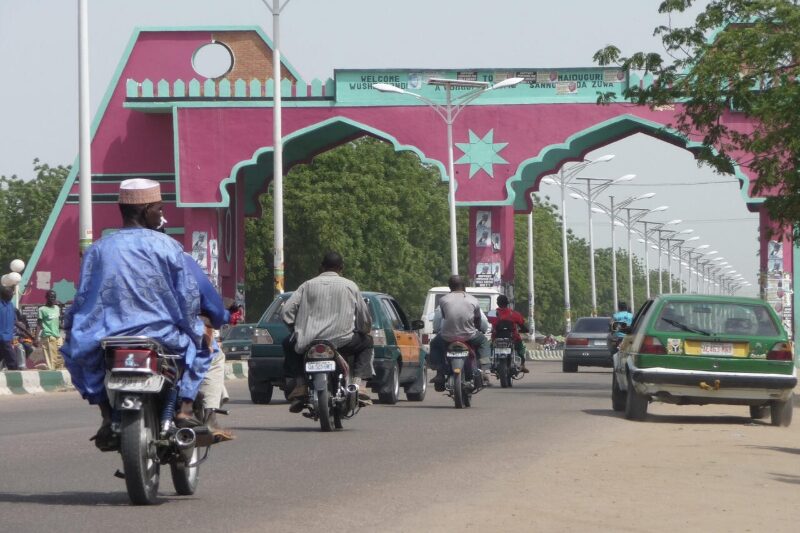The high cost of living, and particularly the major spike in the petrol price – brought about when President Bola Tinubu announced that the fuel subsidy would be suspended from July 1 – has prompted Maiduguri residents to call on the Borno State government to lift the ban on the use of motorbikes in the city.
They say that if the ban, which has been in place since 2011, is lifted, it will dramatically reduce transportation costs.
The ban was originally imposed in Maiduguri and in the nearby Jere Local Government Area by the then-governor of Borno State, Kashim Shettima, who is now Nigeria’s vice-president.
At the time, Maiduguri – and the whole state – was in the grip of the insurgency and members of the Jamā’at Ahl as-Sunnah lid-Da’way Wa’l-Jihād (JAS), better known as Boko Haram, used motorbikes to commit drive-by attacks, assassinating military personnel, politicians, police officers and even innocent civilians.
In a state broadcast from Government House Maiduguri in July 2011, Shettima said the ban had become necessary as the killing of security agents, politicians, traditional rulers and innocent citizens continued unabated.
“The ban includes private as well as commercial motorcycles of all categories that operate within Maiduguri metropolis,” his spokesman, Usman Ciroma, said.
At the time motorbikes were one of the most common forms of transport in the capital city because most people could not afford cars.
Now, 12 years later, residents of Maiduguri and Jere said that there was relative peace in the state and it was time for the government to review and consider lifting the ban.
Residents said the rising cost of living was crippling them. The price of services and all commodities – including food – had risen steeply and the major spike in the price of petrol had taken transport fares to new heights.
Mohammed Salisu Waziri, a public affairs analyst and a senior lecturer at the biological sciences department of the University of Maiduguri, said that it was “imperative and appropriate” for the state government to consider lifting the ban on motorbikes.
“In view of the current economic challenges faced by many residents – ranging from the hike in the fuel price, the rise in the prices of food items and increased transport fares – I think lifting the ban on motorbikes would ease some of the hardships.
“Motorbikes are a viable solution and – if used under strict security measures – they could be the answer to the problems faced by citizens, particularly the poor. Motorbikes are cost-effective and they need less fuel compared with tricycles [keke napep] and vehicles. There was a time when I travelled to Bauchi city in the far northeast. I decided to use a motorbike because I had so many things to do and spent the whole day going from place to place. Afterwards, I was amazed to discover I had used only three litres of fuel.”
Waziri said motorbikes were significantly more fuel-efficient compared with cars and they were affordable for many low-income households and ideal for students at higher-learning institutions. The use of motorbikes would reduce the burden on poor people, particularly government workers, who spent more than half of their monthly wages and salaries on transportation.
If the government lifted the ban, he said, it should consider putting in place stringent security measures, such as ensuring that motorbikes were numbered and registered, creating a database of motorbike owners, limiting the number of approved motorbikes within Maiduguri city and its environs, allowing only private individuals to use bikes and establishing a timeframe for when they could be used, for example only from 6am to 6pm. Citizens should also be allowed to ride their bikes only if they wore safety gear, such as helmets.
“If strictly controlled, I believe now that there is relative peace, security and stability in Maiduguri, the use of motorbikes should be allowed and the government should certainly consider lifting the ban.”
Ummi Hussaini, a resident, told RNI she would be pleased if the ban was lifted because it would make transport cheaper.
“Motorbikes are affordable and cost-effective unlike tricycles and cars,” she said.
Ali Kime said that even though there had been a rise in crime recently, the use of motorbikes would “cushion the hardships caused by the exorbitant cost of living for masses of people”.
Musa Ali said it would cost ₦500 to fill a motorbike and the fuel would last for three to four days.
“If you use taxis or tricycles, you spend at least ₦1,000 in transport fares. I back those who are calling for a lift of the ban because it would benefit low-income households, schoolchildren, students, workers and less-privileged people.”
SHETTIMA LAWAN MONGUNO









